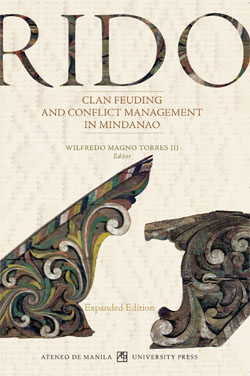Anthropologist Searches for Way to Measure Peacebuilding Success
 |
By any definition, Wilfredo Magno Torres III has already had a successful career. Armed with a master’s degree in anthropology from the Ateneo de Manila University as a Ford Foundation fellow, Torres spent nearly 10 years in conflict management in the Philippines as a senior program officer with the Asia Foundation.
But Torres isn’t satisfied. “I found peacebuilding in the Philippines is a lonely journey in a sense,” the soft-spoken anthropologist says. “You see all these wonderful projects and efforts by our local partners on the ground; they’re doing peacebuilding work, conflict management work and actually resolving conflicts.
“But it’s very difficult to convince donors that our partners’ projects are making a difference. Donors want proof on how our projects have contributed to change from a universe of projects existing on the ground. We need to have more creative ways of capturing evidence in complex conflict settings to support the causal chain that links to change.”
The question of how to measure the effectiveness of a peacebuilding program or conflict resolution effort brought him to George Mason University’s School for Conflict Analysis and Resolution (S-CAR). He hopes the research he completes to earn his PhD at S-CAR will provide a solution, and if he’s successful, his work could be applied throughout the entire conflict analysis and resolution field.
 The new book he edited, “Rido: Clan Feuding and Conflict Management in Mindanao,” explains to the rest of the world how Torres and others have been building peace in the Philippines. A George Mason student since 2013, Torres has already presented his ideas and experiences to the State Department and the Johns Hopkins School of Advanced International Studies (SAIS).
The new book he edited, “Rido: Clan Feuding and Conflict Management in Mindanao,” explains to the rest of the world how Torres and others have been building peace in the Philippines. A George Mason student since 2013, Torres has already presented his ideas and experiences to the State Department and the Johns Hopkins School of Advanced International Studies (SAIS).
“What makes Willy’s work so exciting is that he combines the best intellectual tools with a goal-driven, problem-solving ‘been there’ conflict awareness,” says S-CAR professor Solon Simmons. “The SAIS event helped to give me faith that we are onto something in creating this new science for the world.”
Despite the master’s degree, Torres doesn’t consider himself a scholar. But in the field he discovered he needed a scholar’s skills to help others work more effectively.
“I’m an anthropologist, working to meet donor expectations and at the same time bridge the genuine concerns of communities. To do this, there is a need to better understand the tension between peace-building and state-building frameworks,” he says.
“In my experience, there is a huge difference between grassroots community-based peacebuilding and conflict resolution that is heavy on context and process, emphasizing the cultivation of relations, nuancing, risk-taking and experimentation on the one hand, and the more state-centric approaches preferred by donors characterized by institution building, good governance, rule of law and the concern for attribution in measuring impact on the other. We need continuous efforts to bridge these two perspectives.”
Torres knows the methods used to mitigate localized conflicts in hot spots in the Philippines, including violence-prone Sulu, are effective, as the success stories in “Rido” attest. He’s hoping the book will find an audience beyond the Philippines.
“I hope people here will read it because it can provide scholars and practitioners with a model for capturing the complexity of a protracted social conflict environment and maybe help them design strategic interventions,” he says.
“I haven’t heard people [in the United States] talk about localized conflicts at the community level, or inter-clan feuding, or criminality conflicts or conflicts over resources. These are the types of conflicts we’ve been dealing with.”
And, he adds, successfully so.
Write to Buzz McClain at [email protected]
This material is presented as the original analysis of analysts at S-CAR and is distributed without profit and for educational purposes. Attribution to the copyright holder is provided whenever available as is a link to the original source. Reproduction of copyrighted material is subject to the requirements of the copyright owner. Visit the original source of this material to determine restrictions before reproducing it. To request the alteration or removal of this material please email [email protected].
rosters
IMPORTANT LINKS
- Home
- Admissions
- Academics
- Research & Practice
- Center for Peacemaking Practice
- Center for the Study of Gender and Conflict
- Center for the Study of Narrative and Conflict Resolution
- Center for World Religions, Diplomacy, and Conflict Resolution
- Indonesia - U.S. Youth Leadership Program
- Dialogue and Difference
- Insight Conflict Resolution Program
- Parents of the Field Project
- Program on History, Memory, and Conflict
- Project on Contentious Politics
- Sudan Task Group
- Undergraduate Experiential Learning Project
- Zones of Peace Survey
- News & Events
- Student and Career Services
- Alumni
- Giving





